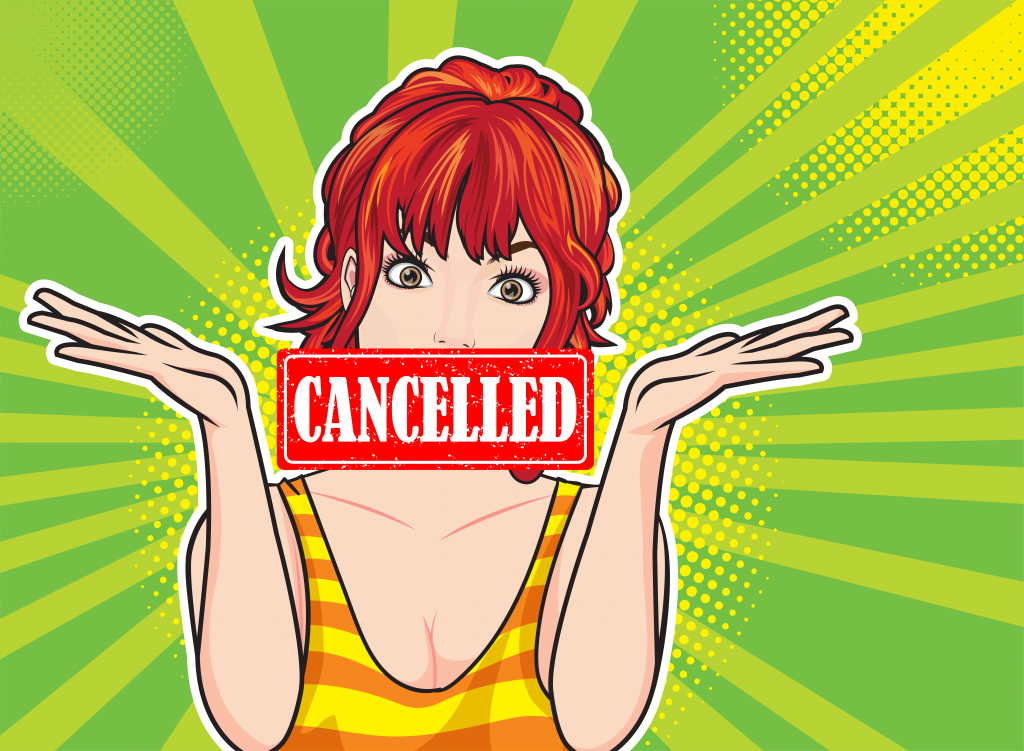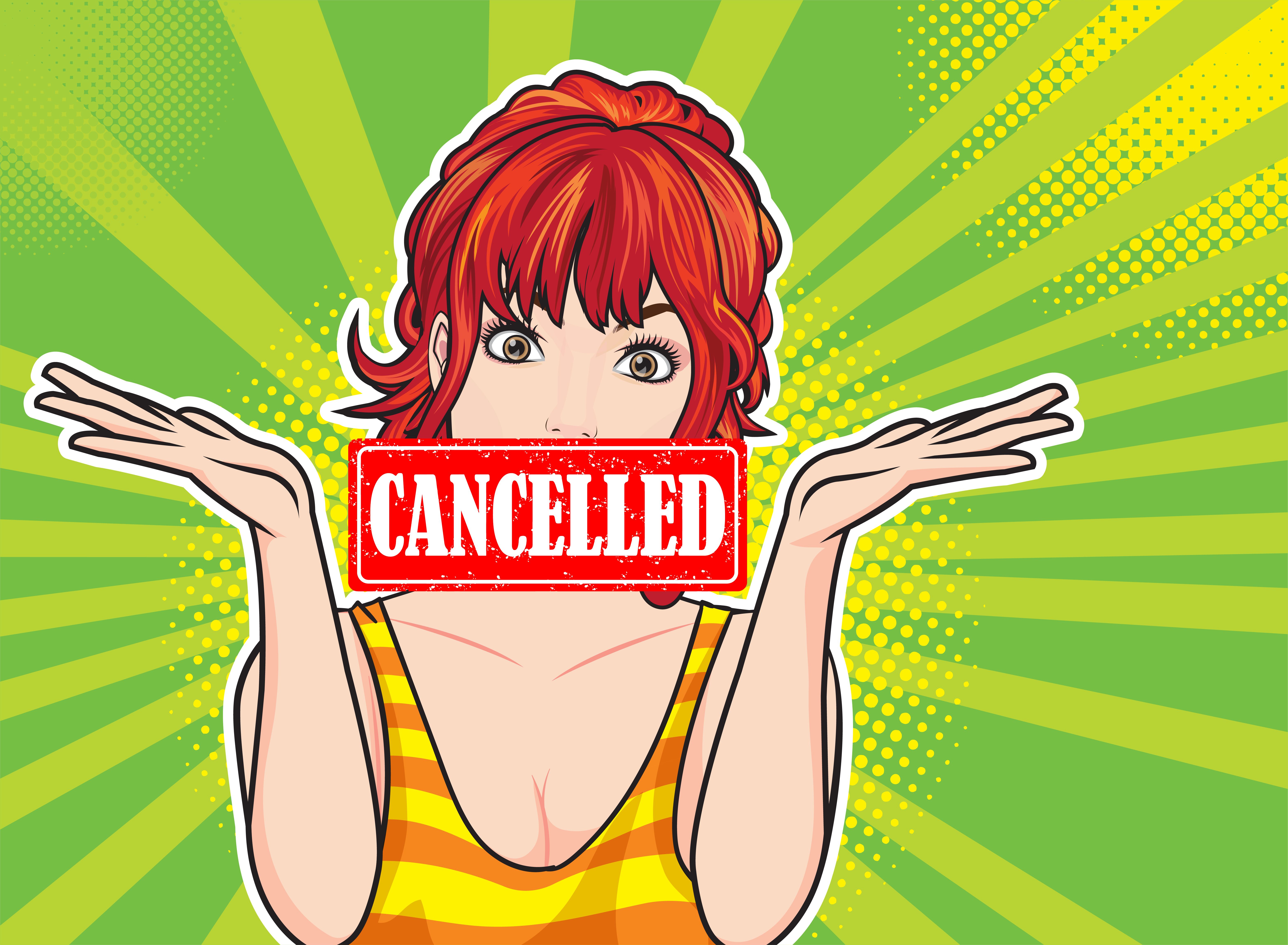Over the past few years, the idea of a person, brand, or even show being “cancelled” has become a polarizing topic of debate. “Cancelled” refers to the public backlash fueled by social media to culturally block a person, company or thing that has been deemed of committing wrongdoing from having a public platform. Calls to “cancel” seek to end a person’s career and revoke the cultural impact of a person or brand via public pressure through multiple forms of social media. Some view “cancel culture” as an important way of publicly calling for accountability, and many view it as an important social justice tool. A method of using collective action to combat some of the enormous power imbalances that exist between public figures who have access to large audiences and the people and communities their words and actions may harm. Others see “cancel culture” as a form of social media mob rule. Some Republican politicians in America have described “cancel culture” as a movement to erase history, encourage lawlessness, mute citizens and as a movement to violate the free exchange of ideas, thoughts, and speech. The idea of punishing or demoting members of society for acting in or promoting ways of thinking outside what is deemed socially normal is something we can see throughout history; however, the rise of mobile technology and broadcasting power of social media has dramatically enhanced the ability to exercise collective action.
To further complicate the issue, deep fakes, video editing, and posts from 20 years ago in high school can and have all been used as reasons to call for “cancelling.” How do you view cancel culture? Is it an important tool of social justice, or do you see it as a new form of collective mob intimidation? Finally, as people’s lives continue to become more public on social platforms and mobile technology becomes more and more integrated into our daily and private lives, how will this part of mobile culture adapt or change?


Cancel culture is an intervention driven almost entirely by left-wing activism and in fact, there are groups on the left that would claim that it doesn’t exist at all (see below). According to this view, protesting censure by appeals to so-called cancel culture are nothing but an attempt to deflect legitimate criticism, often through use of the same power and privilege that lies behind the offence in the first place. I’d like to make two points: a) while it’s true, as Tasneem says, that celebrities often bounce back what about the effect on ordinary people who aren’t famous and who wouldn’t be able to recover so easily, people like Miguel? How many thousands of cancellations never get disseminated by media? My second point is that the chilling effect on discourse is largely unseen. Many voices will never be heard because people will just stay quiet since they don’t want to bring abuse on themselves. I believe cancel culture is actually quite corrosive.
https://www.independent.co.uk/arts-entertainment/tv/features/john-cleese-cancel-me-culture-b1907906.html
For most public figures, I don’t believe “canceling” them has actually been very effective and there are very few cases of actual successful “canceling”. There are huge public figures who have been accused with ample amount of proof of heinous things. For example, James Charles, a very popular makeup Youtuber, was accused more than once of grooming and sending minors explicit messages and photos. The cycle always stayed the same; there would be public uproar, then the public figure would put out an apology to appeal to the masses, then disappear for a while before coming back and acting like nothing happened. While they would lose many sponsorships and fans, most of these canceled figures would eventually bounce back because there is no possible way the entire public would be against them. We’ve seen this exact thing with Shane Dawson, David Dobrik, and Jeffree Star, all who have been accused of things that I believe are worth de-platforming for, but because of their loyal fanbase, they always come back no matter how many scandals they get themselves into.
I personally can relate to this. I had over 3000 followers on Twitter by sharing my knowledge on stocks day trading and after a while I changed my view into taking more of a political and economical stance against the US stock market. I would share information, videos, and articles of how the NYSE is manipulating the stock market. Many of my followers began to take offence in many of the things I would say and I often engaged in critical thinking, criticism and speculation. Often times chats would get a little fired up and due to the amount of controversy and abusive verbal abuse became to intense and the next day my Twitter account was shut down with no reason or explanation. I lost everything I had worked so hard for because of a series of unfortunate events…Do you think cancel culture a mob mentality? Or a long overdue way of speaking truth to power?
Hi Miguel,
Thanks for sharing your personal story. This is one of my primary concerns. Mobile technology such as social media has dramatically enhanced the ability to exercise collective action against any ideas outside the mainstream of collective thought of a prominent or influential group. In my opinion, cancel culture can be both a mob mentality and a way of speaking truth to power. However, I would argue that it is often used to promote specific narratives driven by the same power groups such collective action seeks to punish. Regardless, instead of cancelling, I think we need to rethink and learn how to use mobile technology to encourage discourse, promote conversations and platforms for a wide variety of different opinions and promote agreeing to disagree rather than cancelling ideas and tribalism.